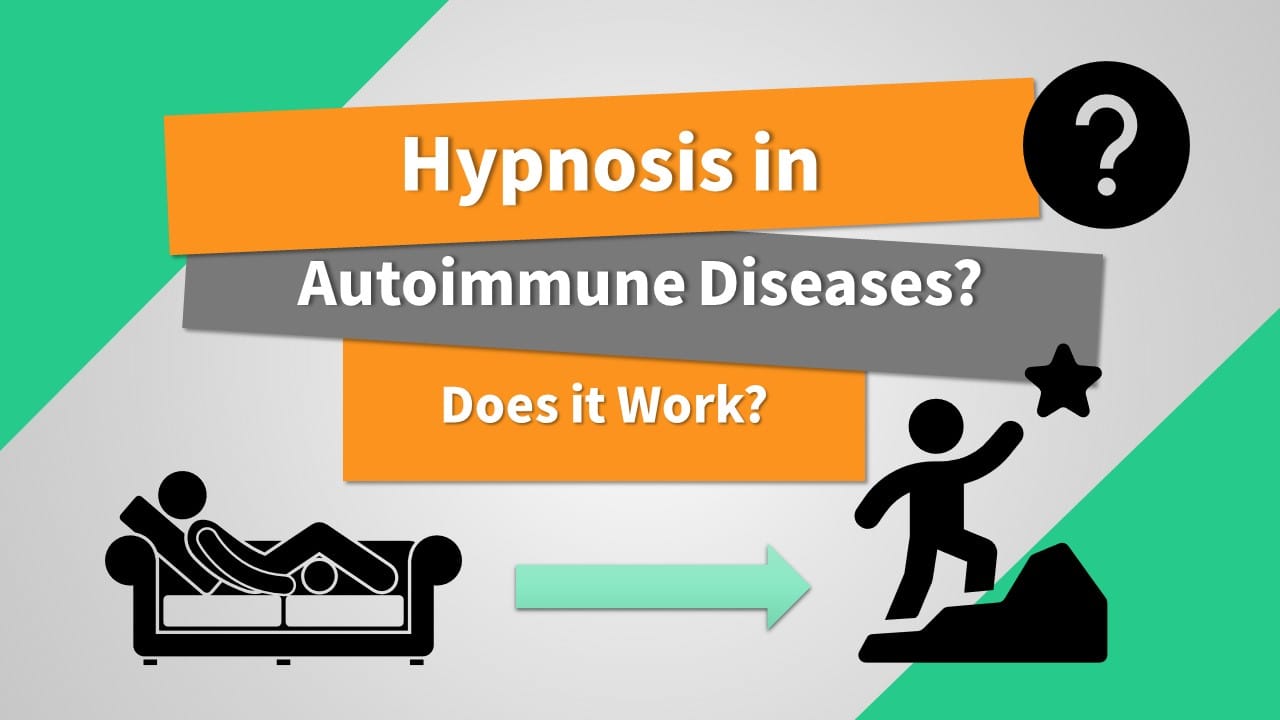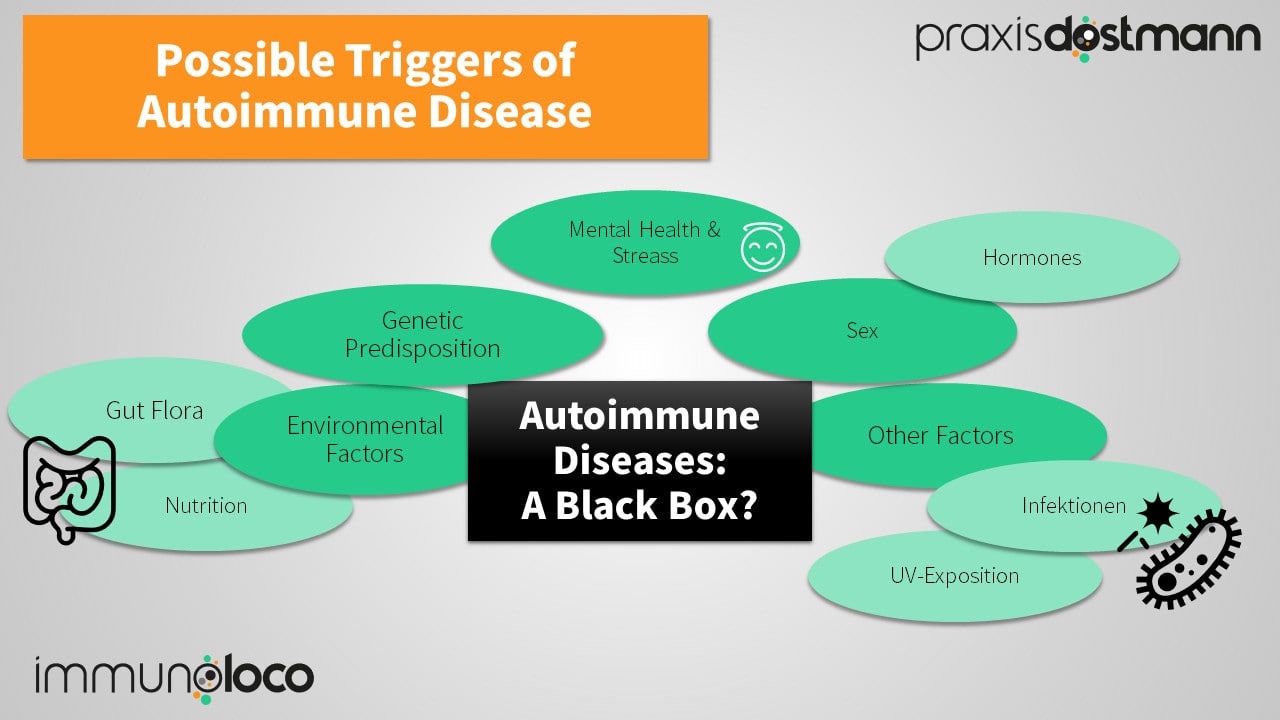
Hypnosis is a psychotherapeutic procedure to put the patient in a deep state of relaxation. Hypnosis can trigger behavioral changes that, according to psychoneuroimmunology, can influence the functioning of the immune system. In addition, hypnosis can help learn a better way of dealing with stress and make changing habits easier.
To date, there are only a few studies and case studies on the use of hypnosis in autoimmune diseases. However, hypnosis has been shown to improve disease activity in patients with rheumatoid arthritis. In small studies, psoriasis and the quality of life of multiple sclerosis patients could also be positively influenced by hypnotherapy.1,2
Individual cases and case series in which hypnosis has had a positive impact have been described in the following autoimmune diseases:
- Rheumatoid Arthritis (randomized study with 66 subjects))
- Systemic Lupus Erythematosus (several single cases described)
- Psoriasis (small pilot study)
- Multiple sclerosis (study and case series)
- Scleroderma (single case)
- Secondary Raynaud’s syndrome (pilot study with scleroderma patients)
- Autoimmune pericarditis (single case)
- Dermatomyositis (single case)
Possible Triggers of Autoimmune Disease
In autoimmune diseases, there is a dysregulation of the immune system. This is likely due to an interplay of a wide variety of factors. These include:
- genetic disposition (predisposition)
- environmental influences
- hormonal influences and gender
- triggering factors
Triggering factors can be, for example, infections that lead to increased activity of the immune system, or physically as well as psychologically stressful experiences.
A retrospective study showed that patients with autoimmune diseases often went through a strong emotional stress phase (job loss, divorce or death of a close relative) before the first disease episode.3 Therefore, stress could play a role in immune dysregulation by influencing the hormonal system.

Autoimmune Diseases and Stress
A study of the disease course of Swedish patients over a period from 1981 to 2013 showed that psychiatric diseases triggered by massive stress, such as an adjustment disorder or post-traumatic stress disorder, are associated with an increased risk of developing autoimmune diseases and especially multiple autoimmune diseases (more than three).4
It should be noted, however, that correlation does not mean causation and that type 2 diabetes was also included among the autoimmune diseases, which is not correct since it is a metabolic disease without immunological involvement.5
Also, suffering from an incurable chronic disease, at least as of today, is usually accompanied by pain, anxiety, and financial and other emotional burdens. Likewise, inflammatory messenger substances can influence sensation and feeling and cause depression. In addition, autoimmune diseases are often only diagnosed after years of suffering.
Thus, a vicious circle of worry and pain due to the disease and stress often develops, which promotes autoimmune processes and has an unfavorable effect on the course of the autoimmune disease and the pain level.
This article is about a health issue. It is important that you have your symptoms examined and treated by medical professionals. This article is not intended to be, and cannot be, a substitute for the care and advice of medical professionals that may be available to you.
Hypnosis for Rheumatoid Arthritis (Rheumatism)
Rheumatoid arthritis, popularly known as rheumatism, is an autoimmune disease that mainly affects the joints and without treatment is also capable of destroying them.
In a study of 66 patients with rheumatoid arthritis, hypnosis was applied to 26 subjects, while 20 other patients learned relaxation techniques, and the other 20 patients served as a control group.
After ten hypnosis sessions, the patients were given an audio recording of the hypnosis, which contained suggestions and images intended to have a calming effect on the immune system. Study participants were instructed to practice at least three times a week.
After three and six months, the subjects were each examined and interviewed. Results showed that joint pain, joint swelling, and stiffness had improved more in the hypnosis group than in the control group, but also compared to the relaxation group. These improvements could not be attributed to a change in medication or more painkiller consumption and therefore seem to stem from the hypnosis.1
Hypnosis in the Case of the Autoimmune Disease Lupus
In addition to forms of lupus that usually affect only the skin, such as cutaneous lupus erythematosus (CLE), which is itself autoimmune in origin, there is also systemic lupus erythematosus (SLE). In systemic lupus, the following symptoms often occur:
- Skin symptoms and UV intolerance
- Joint pain/swelling
- Elevated temperature
- Morning stiffness
- Blood count changes
- Pleurisy or pericarditis
- Damage to internal organs, for example the kidneys (lupus nephritis)
In the case of lupus diseases, there have been no randomized studies on the use of hypnosis. However, in systemic lupus erythematosus, there are some very impressive case reports on the use of conditioning and hypnotherapy.2,6,7
One casuistry is by psychiatrist Moshe S. Torem, who describes the case of a lupus patient who, under hypnosis, used imagery to transform the “aggressive” parts of her immune system into “gentle” parts in the form of white horses. She went into remission after several sessions.2
Now, lupus is a disease that, like most other autoimmune diseases, occurs in flares and thus can not only worsen but also spontaneously subside quite independently of treatment attempts. In addition, it was not precisely described which treatments the patient underwent at the same time. Therefore, it is difficult to say how large the contribution of hypnosis to remission was.

Hypnosis for Psoriasis
In a small study of 11 psoriasis patients, skin-related hypnosis was used in 5 subjects, and neutral hypnosis was used in a control group consisting of 6 subjects, in which no skin improvements were suggested.
After three months of different hypnosis applications, disease-related suggestions were applied in both groups to observe whether this would produce changes in the group previously treated by neutral hypnosis. Participants were not allowed to take any medication and only use a nourishing cream – without ingredients containing cortisone.
Researchers found that psoriasis patients who were highly susceptible to hypnosis benefited slightly more. Likewise, it became apparent that a skin-related hypnosis intervention in the subsequent three months could still produce improvement in more moderately hypnotizable individuals who had previously experienced little improvement under neutral hypnosis.8
Researchers hypothesize that hypnosis and relaxation techniques affect the involuntary nervous system and, through it, the immune system. Via the influence of the immune system, there is eventually an improvement in skin disease.9
Accompanying Hypnotherapy for Multiple Sclerosis (MS)
Multiple sclerosis is an autoimmune disease of the nervous system that often has a relapsing-remitting course, but there is also a chronic progressive form.
Dentist and hypnotist Howard D. Sutcher, himself a sufferer of MS, describes in a case series how symptoms improved under hypnosis and self-hypnosis even in progressive MS courses that otherwise did not respond to other treatment attempts. Alleviated symptoms included significantly increased salivation, increased urination, gait unsteadiness, and paresthesias (tingling, “formication”).10
In another study, self-hypnosis was shown to have a greater effect on daily pain in multiple sclerosis patients than a behavioral therapy intervention. However, the group that combined self-hypnosis and behavioral therapy procedures did best.11
Psychiatrist Moshe S. Torem describes the case of an MS patient in whom the woman imagined her immune system easily recognizing her own cells as not foreign to her body and thus no longer attacking them. The patient then went into remission after a period of prolonged activity. Again, unfortunately, further treatment modalities are missing in the case report. One only learns that therapies were not changed.2
Interested in more information & knowledge?
Every now and then, and only when there’s something interesting for you. Currently less than once a month, but packed with information – unsubscribe at any time and free of charge.
Hypnosis in Scleroderma-patients
Scleroderma, like lupus erythematosus, belongs to a group of disorders called collagenosis. Collagenoses are rheumatic, autoimmune disorders affecting the connective tissue.
Scleroderma patients suffer from an extreme hardening of the skin: Often, the appearance of the face changes, and in addition, the opening of the mouth and the mobility of the tongue decrease due to a shortened lingual frenulum. As a result, the psychological suffering is high because of the disfiguring features of the disease.
A case study describes a patient who had to stop her dental treatment for the time being because of the restricted mouth opening (microstomy) due to the existing scleroderma. However, after hypnotherapy, which was intended to prepare her for the dental treatment that was again to come, she showed a markedly improved mouth opening. The dentist could finish the desired dental treatment and prosthetic restoration after the intervention.12
Successful use of hypnosis in secondary Raynaud’s syndrome due to scleroderma
Raynaud’s syndrome is a vascular spasm that causes the extremities, especially fingers and toes, to lose proper blood flow. This is very painful. In the case of secondary Raynaud’s syndrome, which occurs more frequently as an accompanying symptom in rheumatic diseases, it can even lead to destroyed tissue in severe cases. These so-called necroses arise due to reduced blood flow.
One study examined the skin temperature of the fingers of 12 patients with progressive scleroderma and Raynaud’s syndrome treated with hypnosis or autogenic training. Researchers found that patients in both the hypnosis and autogenic training groups were able to briefly increase the skin temperature of their fingers, which was attributed to improved blood flow.13
However, due to the short observation period, no long-term effects could be studied. Therefore, unfortunately, we do not know if the mental status of the patients improved or if there was a general positive influence on Raynaud’s syndrome and disease activity.13
Dermatomyositis, autoimmune pericarditis and other immune phenomena
Like scleroderma, dermatomyositis is an autoimmune disorder belonging to the group of collagenoses. However, in addition to changes in the skin, muscle weakness is the main feature here.
Autoimmune pericarditis is an inflammation of the heart sac that can occur in a variety of autoimmune diseases.
For both conditions (dermatomyositis and autoimmune pericarditis), there are case reports of improved symptoms or improved disease progression under hypnosis. However, the often relapsing-remitting course of autoimmune diseases makes a clear elaboration of cause-and-effect relationships impossible, as mentioned above.2
Conclusion
I am a hypnotherapist and a sufferer of severe autoimmune diseases myself combined in one person. But, I wanted to paint as unbiased a picture as possible and leave my own experiences out of it. My experiences have been positive concerning my autoimmune disease and therefore I started studying the fascinating world of hypnotherapy. Self-hypnosis helps me to deal with pain and has improved my mental health and in doing so also my physical health. -at least I like to think so. 😉
Unfortunately, the multifactorial triggers and the circumstances that lead to the immune dysregulation in autoimmune diseases have not been entirely and conclusively clarified yet. Nevertheless, when properly applied, I consider hypnosis an intervention that is generally free of side effects.
The good thing is that sufferers can use hypnotherapy in the context of self-hypnosis, even without therapeutic guidance. This can help combat the feeling of being helpless and at the mercy of your own body. With self-hypnosis, you can proactively do something for your own mental and possibly also physical health.
References
1. Horton-hausknecht JR, Mitzdorf U, Melchart D. The effect of hypnosis therapy on the symptoms and disease activity in Rheumatoid Arthritis. Psychology & Health. 2000;14(6):1089-1104. doi:10.1080/08870440008407369
2. Torem MS. Mind-body hypnotic imagery in the treatment of auto-immune disorders. Am J Clin Hypn. 2007;50(2):157-170. doi:10.1080/00029157.2007.10401612
3. Stojanovich L, Marisavljevich D. Stress as a trigger of autoimmune disease. Autoimmunity Reviews. 2008;7(3):209-213. doi:10.1016/j.autrev.2007.11.007
4. Song H, Fang F, Tomasson G, et al. Association of Stress-Related Disorders With Subsequent Autoimmune Disease. JAMA. 2018;319(23):2388. doi:10.1001/jama.2018.7028
5. Shmerling RH. Autoimmune disease and stress: Is there a link? Harvard Health Blog. Published July 11, 2018. Accessed May 15, 2021. https://www.health.harvard.edu/blog/autoimmune-disease-and-stress-is-there-a-link-2018071114230
6. Olness K, Ader R. Conditioning as an Adjunct in the Pharmacotherapy of Lupus Erythematosus. Journal of Developmental & Behavioral Pediatrics. 1992;13(2):124-125. Accessed May 15, 2021. https://journals.lww.com/jrnldbp/Abstract/1992/04000/Conditioning_as_an_Adjunct_in_the_Pharmacotherapy.8.aspx
7. Shenefelt PD. Mindfulness-Based Cognitive Hypnotherapy and Skin Disorders. American Journal of Clinical Hypnosis. 2018;61(1):34-44. doi:10.1080/00029157.2017.1419457
8. Tausk F, Whitmore SE. A pilot study of hypnosis in the treatment of patients with psoriasis. Psychother Psychosom. 1999;68(4):221-225. doi:10.1159/000012336
9. Winchell SA, Watts RA. Relaxation therapies in the treatment of psoriasis and possible pathophysiologic mechanisms. J Am Acad Dermatol. 1988;18(1 Pt 1):101-104. doi:10.1016/s0190-9622(88)70015-8
10. Sutcher H. Hypnosis as adjunctive therapy for multiple sclerosis: a progress report. Am J Clin Hypn. 1997;39(4):283-290. doi:10.1080/00029157.1997.10403396
11. Jensen MP, Ehde DM, Gertz KJ, et al. Effects of self-hypnosis training and cognitive restructuring on daily pain intensity and catastrophizing in individuals with multiple sclerosis and chronic pain. Int J Clin Exp Hypn. 2011;59(1):45-63. doi:10.1080/00207144.2011.522892
12. Ramazani M, Zarenejad N, Ebrahimi K. The Help of Hypnodontics to a Patient With Scleroderma ‒ Case Report. Iran J Psychiatry Behav Sci. 2015;9(1). doi:10.17795/ijpbs211
13. Seikowski K, Weber B, Haustein U-F. Influence of hypnosis and autogenic training on the acral blood circulation and on the coping with the disease in patients with systemic sclerosis. Hautarzt. 1995;46(2):94-101. doi:10.1007/s001050050216
Heilpraktikerin in eigener Praxis, Hypnosetherapeutin, Besitzerin eines verrückten Immunsystems mit autoimmunen Spezialeffekten, die sie nach ihrem Studium mit ebensolcher Hingabe medizinische anstatt wirtschaftswissenschaftlicher Abhandlungen wälzen lassen. Wenn ihre Gelenke und Mastzellen es zulassen: begeisterte Heimwerkerin
Immunoloco unterstützen
immunoloco möchte Betroffenen kostenlos gute und hilfreiche Informationen rund um ein verrücktes Immunsystem bieten. Du findest das gut? Dann unterstütze immunoloco und meine Arbeit doch gerne. Jeder Euro zählt und hilft, das Projekt weiterleben zu lassen.

Hi Lisa,
I loved your article on hypnosis as a potential treatment for autoimmune disease. As a sufferer of eczema myself I have had one transcendent experience, actually with a psychologist who guided me through a meditation. It felt like I was literally transported and hallucinated (what I would imagine a psychedelic experience would be like) with no stimulus besides the guided meditation. The 90 minute session seemed to only last about 20 mins. in my mind and it resulted in the strongest feeling of calm I have ever felt (as well as the greatest relief of symptoms only matched by steroid use). Anyway, through Dr. Andrew Huberman’s work and now your article, I now realize that my experience was likely close to the hypnosis effect you wrote about.
That being said, do you have any recommendations of protocols one could try? Do they differ depending on the disease or disease state?
Thanks in advance for all of your great work,
Jordan
Hi Jordan,
Thank you for your kind words. Hypnosis can have a profound effect on itching and can be a part of the puzzle, but it depends on the individual. Everybody is different and reacts differently.
I think you might profit from learning self-hypnosis and working with a practitioner who can guide you in the process. It might take some time, but then you can bring on these benefits yourself without needing help from anyone.
Thanks for reading & have a great day!
Lisa
I see that you often post references to support your articles. I see in this article that there are numbers that might be connected to a reference list, but I don’t see the actual references. I’m a hypnotherapist who is interested in learning more about effective ways to tackle inflammation with hypnosis and would love to know what articles you found relevant. I hope I’m not missing something obvious! Thanks!
Hello Allison,
you are right – in the translation I was missing the references, please find the updated version now.
Thanks for commenting!
Best wishes
Lisa